Dozens of successful collaborations.
Hundreds of wonderful people.
Thousands of belly-laughs.
Several very difficult conversations.
Plenty of wins.
Some tears.
A few incidents I would prefer not to re-live.
Numerous vacations.
A handful of working weekends.
Zero all-nighters.
Much more balance than unbalance.
That’s what 25 years of freelance life have looked like for me.
I launched the one-man consultancy that would become Three Deuce Branding on Monday, June 16, 1997. I had a computer, one client and no plan. Only two of those things were helpful.
Though I made the decision to go solo in about a day, it’s been responsible for almost all the good things in my life since.
Taking Stock of 25 Years
What follows is a bit of a reflection on what I got very wrong, and mostly right, in these last 25 years.
I did this exercise for my own purposes. But I’m sharing my notes, edited for coherence, in the hopes that my experience may help you, no matter where you are on your journey as an independent consultant, creative or freelancer.
Through my mistakes, I hope you’ll take the pressure off yourself to get everything exactly right. Very few mistakes are fatal or irreversible.
Much of the advice I share, especially in my newsletter and on Twitter, is based on the mistakes that Younger Matthew made. In doing so, I hope to keep you out of the ditches I fell into.
I hope you’ll also see that you’re doing many things well, even if some days are rocky. That’s part of the journey. Give yourself credit for what you’re doing well, keep your vision front and center, and keep moving forward.
What I Got Very Wrong
This isn’t everything I got wrong in 25 years, because we don’t have that much time.
But these are the big ones where, with the benefit of hindsight, I find myself saying, “Matthew, you could have saved yourself some struggle.”
Where appropriate, I’ve added tools or ideas that have helped me to right my own wrongs.
1. I didn’t start with a plan.
This was dumb, and I was lucky. Certainly, I didn’t give enough thought to the space I wanted to play in, the clients I would serve, and how I would find them – or, at first, even the work I wanted to specialize in.
Lately, I set an annual income goal, but I build and run my growth plan in 90-day blocks. Every three months, I plan the next quarter down to the week.
But the right way to plan is the way that works for you. What’s important is to define where you are, where you’re going, how you’ll get there and why that matters.
2. I underestimated the need to fill my pipeline.
As a function of not having a plan, I didn’t do enough marketing. I was so busy servicing my first client that I forgot to find others.
So, after earning respectable income my first three months in business, my income for months four, five and six was nil, nada and nothing.
If I’m doing the glass-half-full thing, I’d say few things are more motivating than “no income and none in sight.” I don’t suggest dropping your income to zero to learn this lesson.
A better way: Treat yourself like one of your most important clients. The marketing of your business is one of your top priorities. This means carving out bandwidth for it, and advancing it every week. If you show up in the right places, consistently and with value, you’ll do just fine.

3. I was slow to learn to sell.
I used to have a visceral aversion to sales. This was the late ‘90s, remember; a few too many people had watched Glengarry Glen Ross and concluded that Alec Baldwin’s character – the tough-talking “Always Be Closing” guy – was the goddamn hero.
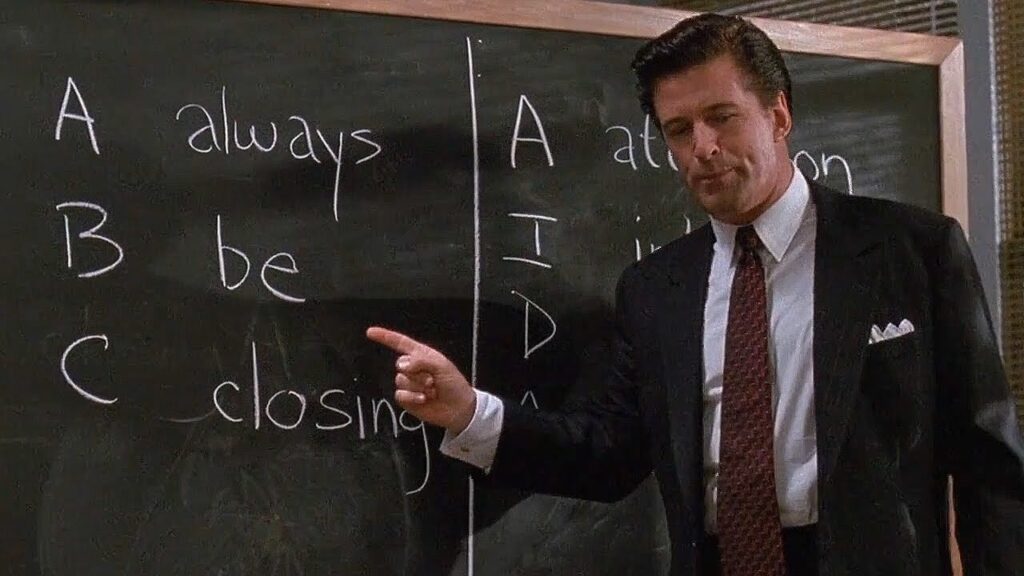
But this aversion prevented me from grasping an important detail: I wasn’t going to be in business for long if I didn’t learn to close a sale.
A better way: “Listen to understand.” Those three words were handed to me by a business development guy that I trusted and respected. “Stop selling what you have,” he added, “and start listening to what they need.”
So now I approach sales as a conversation, not as a pitch. I’m there to understand their needs. That’s mostly about asking good questions. If I can help, great! If I can’t, maybe I know someone who can.
4. I positioned myself poorly.
In the first few years, I told people I was a “marketing consultant,” which is about the same as telling them nothing at all.
Predictably, I attracted a bunch of inquiries that didn’t fit my skill set.
When I shifted my focus to “positioning, strategy and guidance for challenger brands,” my business took off.
Today, there are more soloists than ever. So positioning is more important than ever.
Clarity is job one. It’s okay to lose the sale because they don’t need what you do. It’s not okay to lose the sale because they don’t understand what you do.
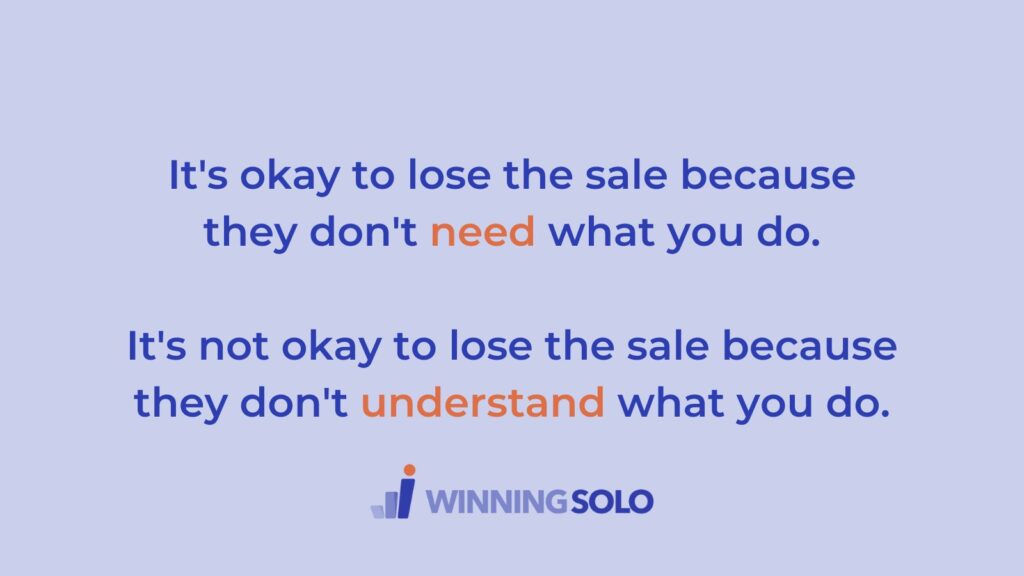
5. I’ve let my network go cold.
People buy from people they know, like and trust. The best source of business is people who already trust your work and character.
But I’m not a natural networker, and sometimes I’ve simply stopped reaching out. I’ve gotten better about this, but I’d still give myself maybe a B grade.
A better way: Be the person who reaches out. 90% of people don’t do this, and most will appreciate you for making the effort. I treat it like a catch-up, not a sales call.
A thought to ponder: Could you reach your goals if you focused exclusively on networking? Some soloists do exactly this. Even three reach-outs per week could transform your business.
6. I didn’t get a few important conversations in writing.
Here’s the very short version of perhaps the most difficult professional experience I’ve had:
A Cincinnati-area agency owner reneged on a handshake agreement after four of us had completed months of work on his behalf. He paid us some, but not all, of the money he had promised us; seventy grand evaporated just like that.
Then, at the 11th hour, two of my partners on that project – people I’d known for a decade – decided that they wanted to reallocate the slices of the now-smaller pie. This reallocation favored the two of them, of course. And one of them was holding the single check that was meant to cover all four of us.
There was nothing we could do about the seventy grand, because our project leader didn’t get it in writing. But I did have emails that said, “This is how the four of us have agreed to slice the pie.”
Those emails would have stood up in court, and it was my threat of a lawsuit, after weeks of back-and-forth, that finally got me paid.
A better way: Whether it’s someone you’ve done 20 gigs with, a close friend or your mother – if money is involved, get it in writing.
The few other times that clients have tried to get funny with the money, I’ve had a signed contract to lean on, and that’s made all the difference.
7. I didn’t read enough.
I can think of no better way to access someone’s brain than reading a book they wrote. At about $10 a pop, the ROI on a good book cannot be calculated.
But still, there were years of my life when I barely read at all. “I’m too busy,” I told myself, probably while watching whatever soccer game happened to be on TV.
I’m making up for it lately, but I missed some learning opportunities when I was younger.
A better way: Set a target for the number of books you want to read per year. (My own target is 24, but for the last several years I’ve been averaging over 40.)
Only pick up books that you’re excited to read, and you’ll read more. If that means you’re reading fewer business books and more biographies, or fiction, or humor, so be it. Any well-selected reading is better than no reading. And if you’re not enjoying a book, quit it and move on to the next.
8. I was slow to adopt journaling.
If I were to identify one thing that’s been most beneficial for my mental health in the last decade or so, it would be daily journaling.
I start every day with gratitude journaling, which I adopted after reading Sonja Lyubomirsky’s “The How of Happiness.” My approach is simple: I list three things I’m grateful for, and one experience to savor from the last 24 hours.
If I get stuck, I turn to the following prompts:
- Today I get to…
- I really enjoyed…
- I’m looking forward to..
- It feels good that…
- One thing I appreciate about myself is…
- I’m grateful [name] is in my life because…
- I’m proud of…
- I’m lucky because…
I close every workday by making notes in my “Work Wins” journal. Here, I’m focused on three questions:
- What were my wins? (Mindset, habits or achievements, big or small.)
- Who did I help?
- What did I initiate?
Every 30 days, I review both journals, to reinforce the good stuff and spot patterns.
I don’t know if this counts as a full-on regret, but I do wish I had started this habit much earlier.
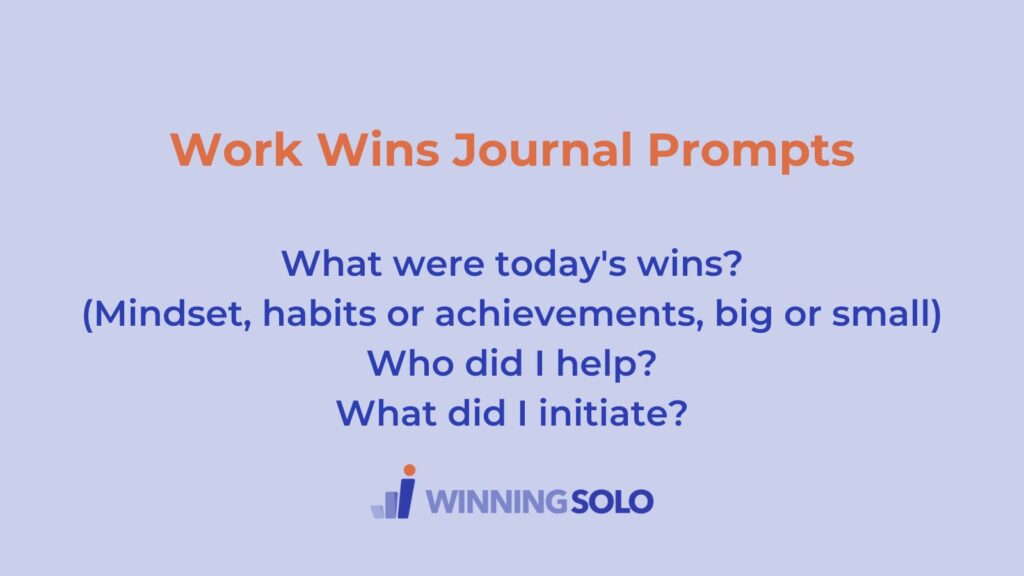
9. I haven’t written that book yet.
It’s flattering that a number of people have told me I should write a book, because they’d want to read it. But it’s a hell of a challenge to write a book while also running a successful consultancy.
Clearly, others have threaded this needle. But I haven’t yet.
I enjoy sharing concepts that work. I enjoy giving people tools they can use. But as it turns out, I also enjoy overthinking.
The underlying lesson is to make time for what’s “important but not urgent.” In other words, if 2023 ends and I still haven’t published that book, you have permission to remind me of this commitment, in whatever language you choose.
10. I didn’t actively build a support network until recently.
When I started out in 1997, there were far fewer independents to learn from, and they weren’t as easy to connect with as they are now. It also didn’t help that my wiring includes a bit of a “lone wolf” streak.
I did find a few other independents early on, and we’ve acted as each other’s informal advisors over the years. But that was dumb luck – the universe put them in front of me.
In 2019, I joined my first community of freelancers, as part of a workshop. From there, a few of us spun out an accountability team that met for nearly two years. More recently, #FreelanceChat on Twitter has brought a bunch of terrific people into my life.
Whether coaching, mentoring, peer groups, accountability teams or friendly chats, there are people out there who are ready to help you – and there are people you can help too. My advice is to not wait decades to find them.
I’m only here because of the generosity of other people.
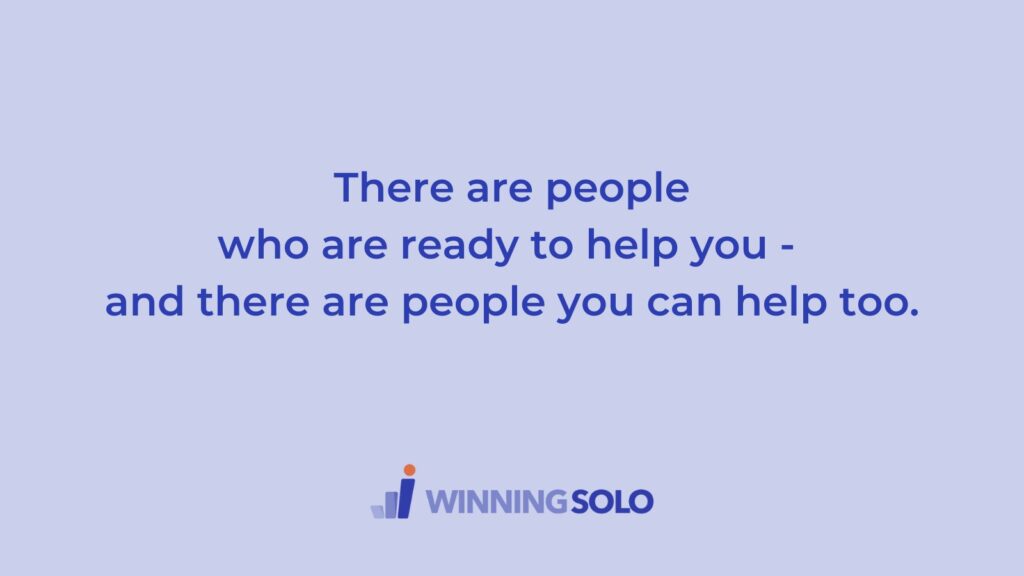
What I Got Mostly Right
It hasn’t been a constant comedy of errors, since I’m still standing. And since I got some things right, I wanted to share those as well.
It’s telling that I found it much easier to write about “what I got wrong” than “what I got right.” But in this section, I’m trying to practice something I preach to other soloists: Recognize your wins, big or small, and do it regularly.
So here are the things that I managed to get right, or at least mostly right, in these last 25 years.
11. I had client-side experience.
I have seven years of client-side brand management experience, including two as a VP-Marketing for a major confectioner. In all seven of those years, I led brands to double-digit growth.
This background certainly helps my credibility with the brand leaders who hire me. It also makes a difference in my interactions with my clients and the quality of my recommendations.
To be clear: Client-side experience is not a requirement before going solo. But it can certainly help.
12. I started young.
If you’re thinking about making the leap, it may help to ask the question I asked myself at age 27: “What’s the worst that can happen?”
If I was a complete bust as a consultant, I’d just have to find another job. And I’d be better for the experience.
Plus, I was blissfully naïve at that age. I just assumed everything would turn out fine.
As I’ve grown and changed, my business has grown and changed with me. This is an unsung benefit of freelancing.
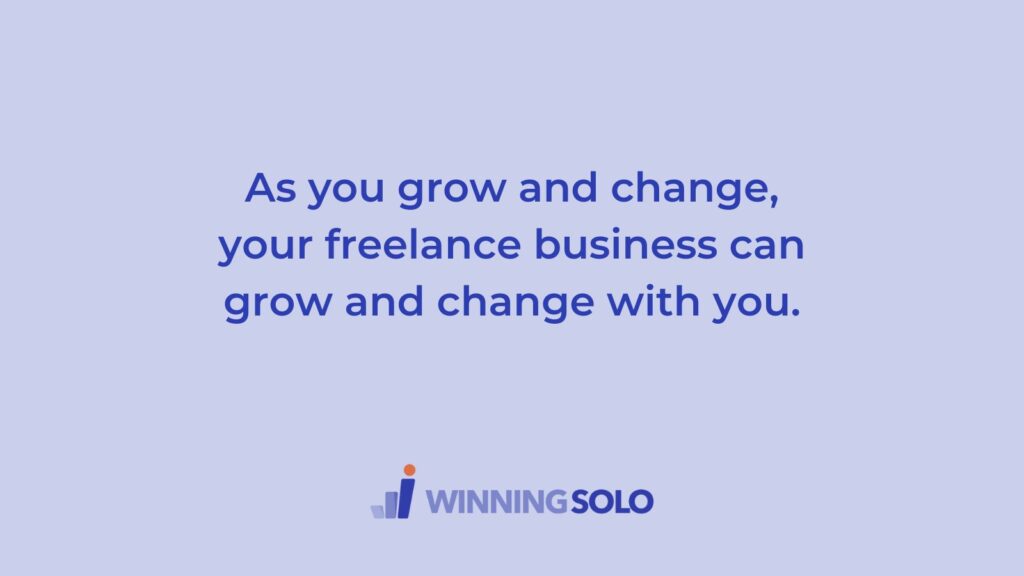
13. I’ve recognized my own agency.
If something in my business isn’t bringing me joy, I’m quick to change it.
If a client is unreasonable, disrespectful, or abusive, I don’t work with them again.
If I find myself dreading my own marketing, I choose a new tactic I enjoy.
Don’t get stuck in the idea that things must be done a certain way. It’s your party. You make the rules.
14. I’ve set my terms of engagement.
One of our top responsibilities, as freelancers, is to create the conditions in which we do our best work.
And we have more control over these conditions than we often realize.
A few examples:
One of my principles is that brand strategy is a matter of depth. Depth takes a little more time and costs a little more money, but it also has tremendous long-term value. If the client values “fast and cheap” over “thorough and deep,” we’re not a good fit. So I don’t take gigs that sacrifice quality for speed.
I get a deposit of 50-70% for every project, and the remainder prior to final deliverables. Chasing money is soul-crushing and infuriating, and this helps to keep it from happening.
I’m clear on my project timelines and the accountability within them. They’re designed so that neither party has to work overtime to get to a good outcome. We just need to keep our commitments to each other.
Good questions to ask yourself:
- What are the conditions in which I do my best work?
- How can I set expectations and establish rules to support those conditions?
- How can I eliminate distractions, multi-tasking and unnecessary meetings?
- How am I complicit in creating the conditions I say I don’t want?
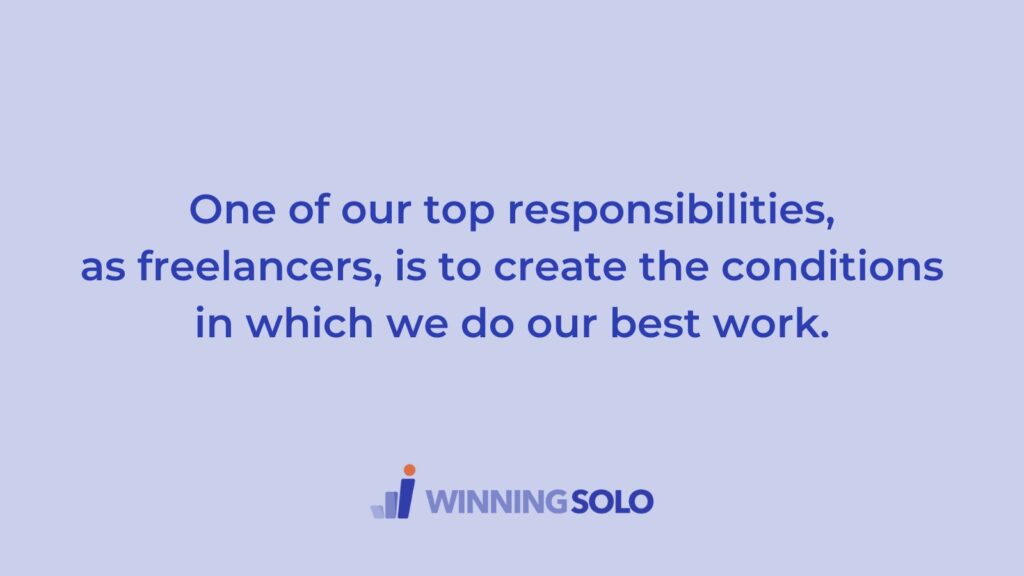
15. I’ve taken advantage of the flexibility.
As recent events have taught us, the idea that we should all cluster in an office for eight hours a day, five days in a row, is antiquated. It has its roots in factory work, not knowledge work.
I got that memo earlier than most. I remember marveling at the amount of time I saved by avoiding a commute and inessential meetings. (Assuming a one-hour daily commute, I’ve saved over 6,000 hours in 25 years. That’s three full years of workdays.)
Flexibility also means optimizing the flow and structure of my time. Lately, that means breaking up my day with a ride on the Peloton, blocking daily time for deep work, and protecting my mornings for my most important tasks.
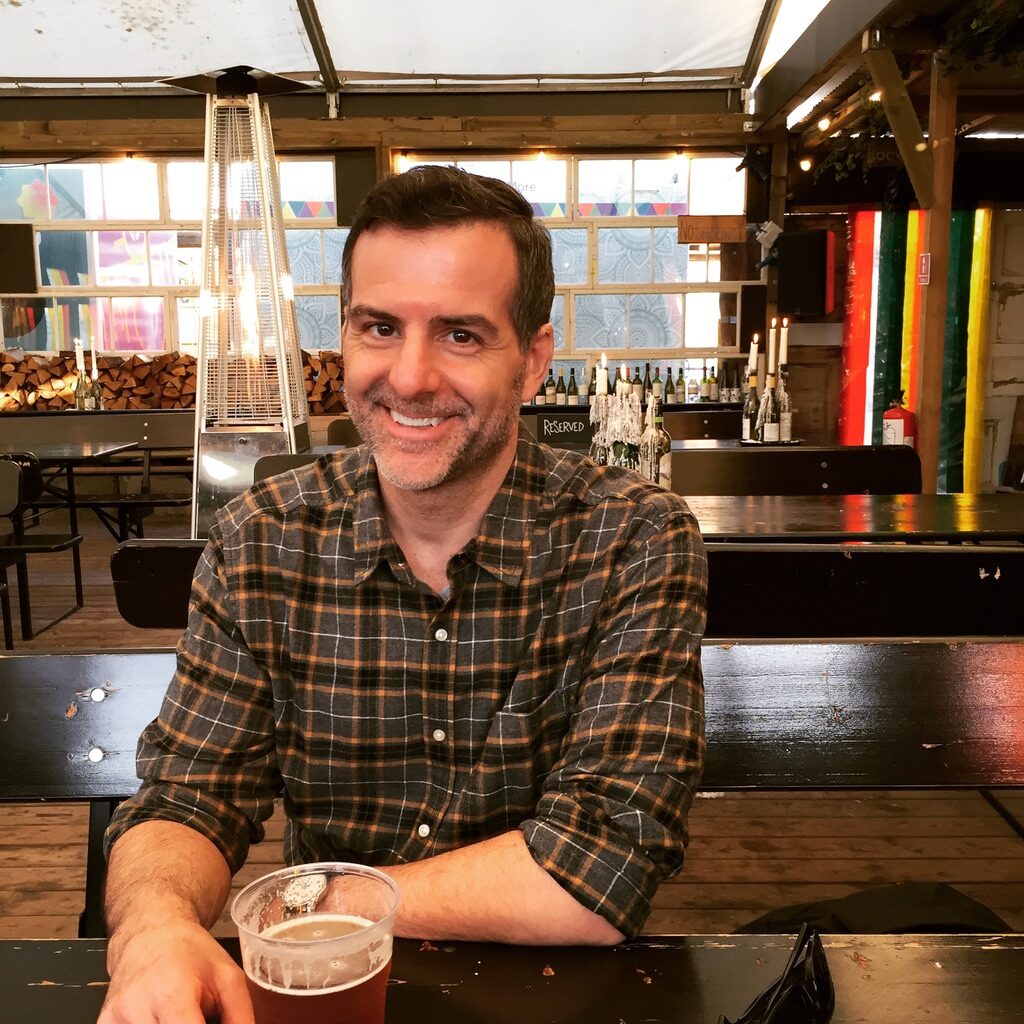
It also means the occasional spontaneous lunch with wifey, or an impromptu long walk when the weather tells me to get outside. It means I’ve traveled a good bit. (And yet there’s always somewhere new to go.)
It means I usually work, at least a little bit, every day of the week. But I rarely have a day that leaves me feeling spent.
That’s what my flexibility looks like. Yours may look entirely different. That’s kind of the point of flexibility.
But freelancing is ultimately an exercise in lifestyle design. If you’re on this path, I encourage you to make the most of that.
16. I went narrow and deep.
Getting my own positioning sorted out was the first step in focusing my offering. After flailing a bit, I chose to get very good at a few things that I greatly enjoy and that the market needs.
When you focus on a few things, over time, you not only come to be seen as an expert. You – here comes the crazy part – actually become an expert.
I’m not saying it can’t be done otherwise, but broadly speaking, generalist work is the province of larger agencies. We soloists are better equipped for specialization and/or niching.
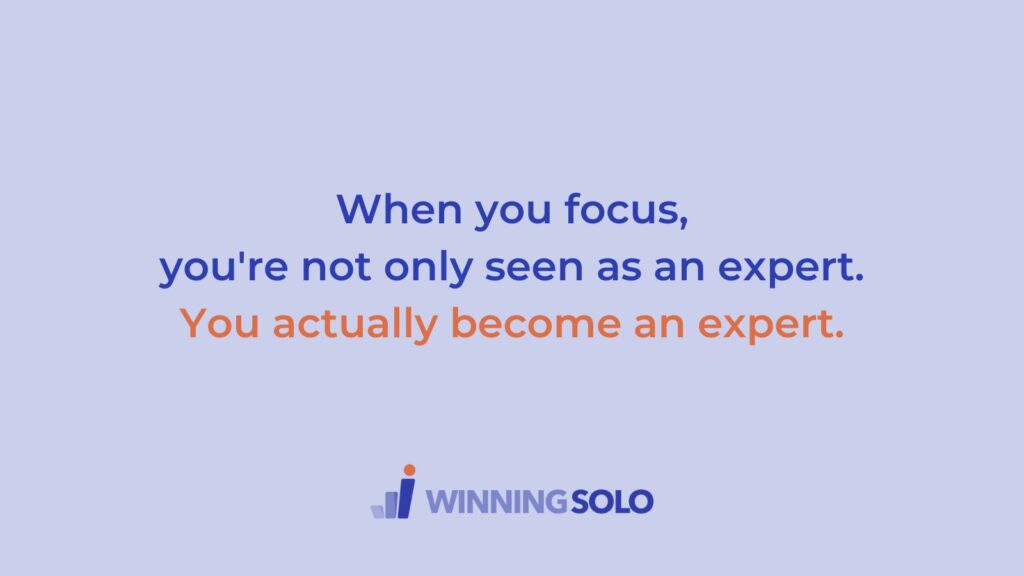
17. I’ve screened my clients.
One thing I know for sure: I was not put on this earth to work with assholes. And neither were you.
Fortunately, there are plenty of people doing work that matters, for the right reasons, and with the right posture. Those are the people I want to work with.
And here’s one of the most pleasant features of freelancing: You get to meet a bunch of these people, and your relationships often extend beyond work.
It’s one thing to spot a red flag. It’s another thing entirely to act on it. And every time I’ve ignored a red flag, I’ve regretted it.
18. I’ve tracked & analyzed my hours.
As freelancers, our time is our inventory. So I was always attuned to the idea that effective use of time would be a key to staying in the game.
I analyze my time regularly. I’m always looking for low-value, low-leverage activities that I can outsource, minimize, automate or quit.
If it feels like you’re spending too much time on social or reading newsletters, I urge you to quantify it. Then compare it to your other time investments, and ask which are working hardest for you.
Track your time closely for 30 days, and I think you’ll see the benefits. Plus, it’s a nice feeling to know that you’re continually getting more effective.
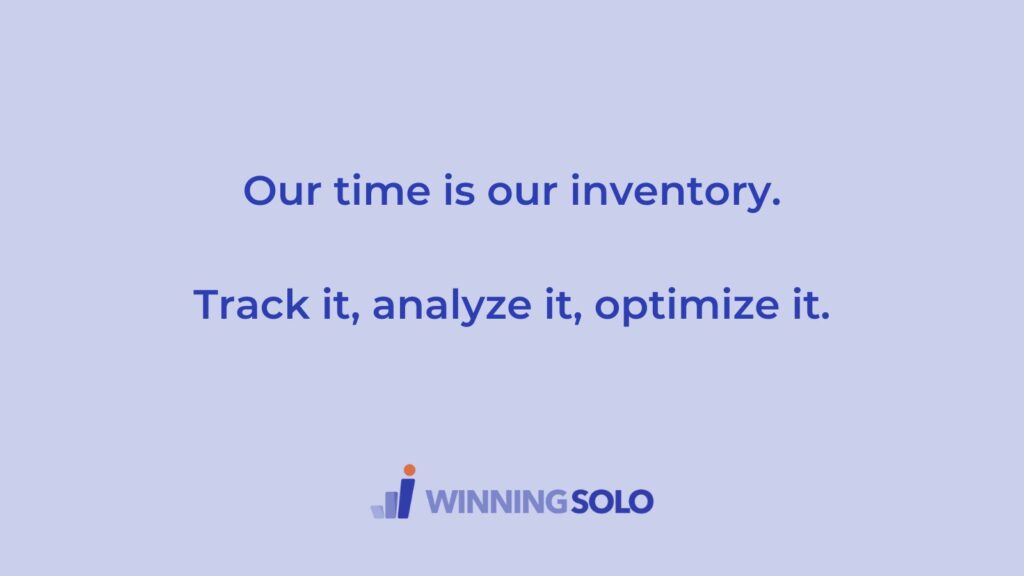
19. I partnered with my local Chamber of Commerce.
Very specific tactic here! And I’m not saying you should do the same thing. But I present this little story as an illustrative example.
A few years into my freelance career, I was the featured presenter at a well-attended Greater Cincinnati Chamber of Commerce lunch-n-learn. I prepared well, and that preparation was reflected in the overwhelmingly positive feedback the Chamber received.
So I’d earned the Chamber’s trust and was invited to do a few more presentations. I continued to follow the rules of “never sell from the stage” and “give value away generously,” so these were well-received too.
With a bank of credibility thus earned, I proposed a half-day small-business training program to the Chamber. They accepted, and we ran that training about 15 times over five years.
The Chamber’s promotional power meant great exposure for me. The trainings were highly-rated, and were good sources of future clients.
The Cincinnati Chamber was also a treat to work with, and truly committed to member education – so, here again, I was lucky.
The lesson here is not “partner with your local Chamber.”
The lesson is: Look for (or create) opportunities that play to your strengths.
(Without Whom Department: Many people at the Cincinnati Chamber back in the day, in particular David Owens and Tamara Lang.)
20. I’ve been unafraid to have the money conversation.
Business is about the exchange of value. If your services deliver value – and they do, right? – you deserve to be compensated fairly for that.
At some point, fees must be discussed. I prefer discussing them sooner than later. Better to use price as a screener, not as the final section of a speculative proposal that you spent hours building.
You want to be prepared for this conversation at any time. I recommend knowing your range for your various services and processes, including a floor that you will not break.
To the extent that you’ve positioned yourself as an authority, created high-value offers, and placed them in front of people who can benefit from them, this conversation is much easier.
Some prospects won’t want to pay for your value. That’s to be expected, and their budget is not your problem. Focus your marketing and sales on the clients who will invest.
And remember: It’s silly to build experience over years, only to sell it cheaply by the hour. When you discount your value, you make life more difficult for Future You.
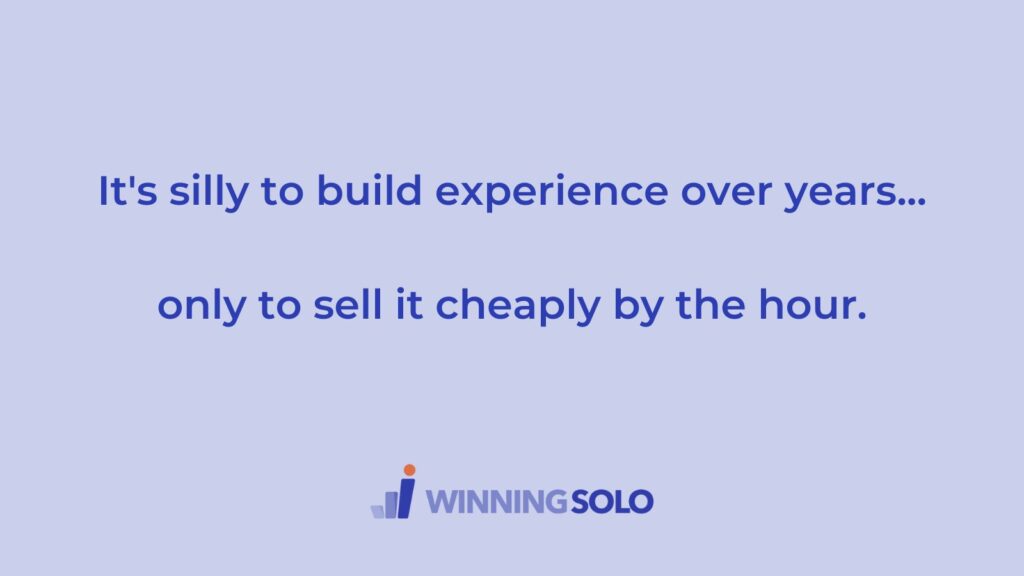
21. I’ve remained fiscally conservative.
I’m 52, and I’m driving the third car I’ve ever owned. I think I can get another five years out of it.
And people are shocked when they learn that our wedding cost $400, and yet we’re just as married as they are.
So I’ve got some psychological wiring that has served me well. All else held equal, someone with fewer expenses stays in this game longer than someone with more. (Please note the difference between expenses and investments.)
Pro-tip: Set an appointment with yourself to review and ruthlessly trim expenses every 90 days. This is particularly important in the age of the monthly recurring revenue (MRR) model, which has had the net effect of making everything far more expensive for us soloists.
And I recommend setting aside at least six months of living expenses. This is leverage in any negotiation, and you’ll never have to take a gig just for the money.
22. I took a sabbatical.
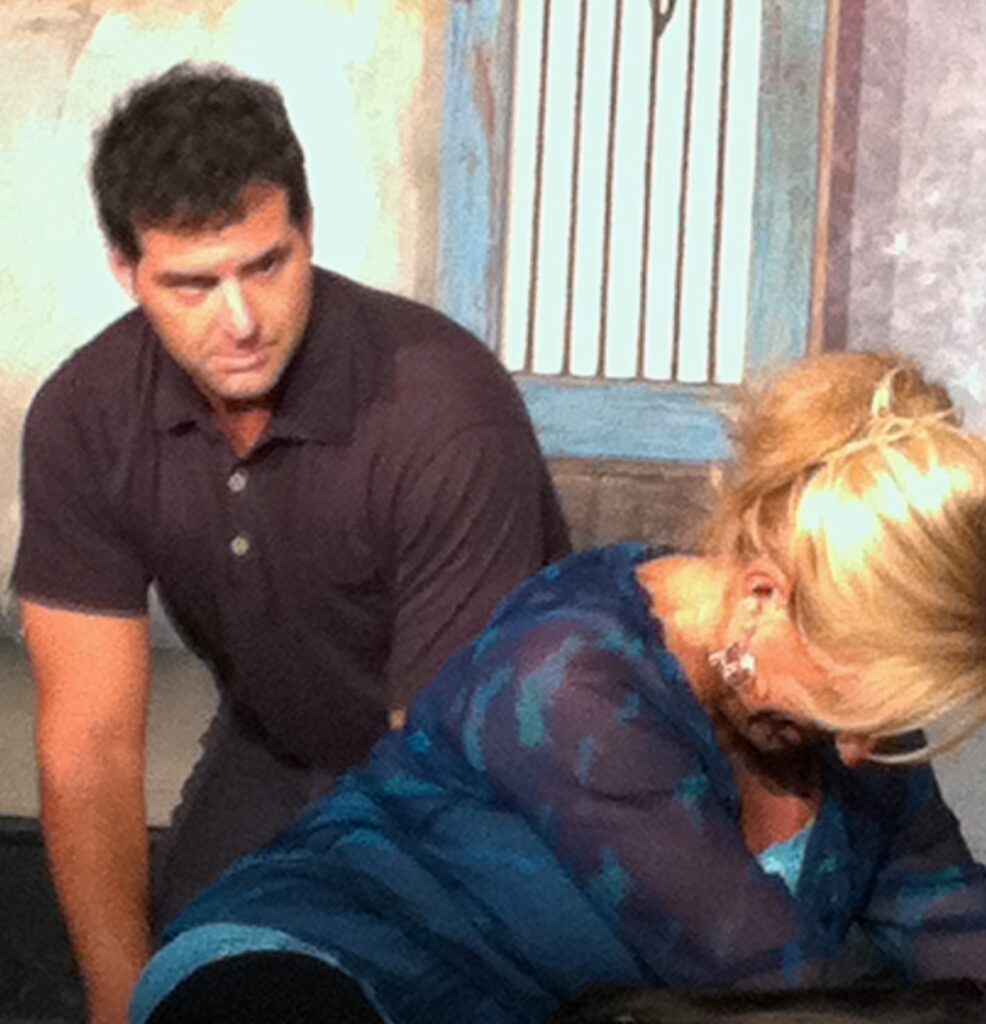
A little over a decade ago, after a particularly difficult professional experience, I decided to tap out for a bit. For three full months, in fact.
I didn’t do any networking. I didn’t entertain client inquiries. I didn’t even read newsletters.
Instead, I started reading books again. I took improv classes at Second City. And I gave myself space to figure out what I wanted to do, and with who, and how.
If you need space and time, give yourself that gift. You won’t regret it.
23. I’ve had some terrific partners.
Around the time I launched my consultancy, I had an opportunity to join Doug Hall’s Eureka! Ranch as a hired gun – a “Trained Brain,” in Eureka! parlance.
For a decade or so, I got to play a role in inventing new products and services for a host of Fortune 500 companies. I learned a ton about innovation, facilitation and concept writing, worked with fantastic people and had a blast.
Via a partnership with Interbrand, I learned design principles from some of the best in the world, like P&G.
For two decades now, Carol Shea of Olivetree Insights has been my first call in all research-related matters. I’ve lost track of how many projects we’ve done together.
And, with very few exceptions, my clients have been a group of fundamentally decent human beings who are looking to create positive change.
Sometimes life presents you with the chance to learn something new, do work you couldn’t do alone, and/or partner with people you really enjoy. Grab those chances with both hands when they come along.
24. I’ve played the long game.
I never thought of freelancing as a stopgap, a flight of fancy or a “hustle.”
It’s a legitimate form of employment with a lot of benefits. So my focus has been on playing the game as long as possible.
In practice, this has meant:
I don’t chase arbitrary income goals. I want to have time freedom, and I don’t ever want to take a gig just for the money. This also makes me immune to the “influencers” with their “one-hour workdays” and their “beachfront villas.” I’m not buying what they’re selling.
I never take it lightly. “Fake it ’til you make it” is one of the biggest bits of nonsense foisted upon us by the personal-branding types. Our reputations are at stake. So are our clients’ investments. Experienced people can smell a fake a mile away.
I’ve tried to always do work that I’d sign my name to. Certainly, I can look back at any given project and say, “I could have done something better.” But I also stand behind my body of work. And the statistic I’m most proud of: 94% of my lifetime revenue has come from repeat business or referrals.
I work with others who play the long game. They aren’t hard to spot.
I don’t work myself to death. Nobody does remarkable work when they’re exhausted. And doing remarkable work is how we get rehired and referred.
I’ve sought meaningful work in a healthy environment. In other words, the work must matter, and the conditions have to be positive. I don’t want to peddle cigarettes, and I don’t want to work with abusive egomaniacs.
“Meaningful work in a healthy environment” is my own north star. I encourage you to define yours. It makes everything about soloism significantly easier.
25. I’ve been lucky.
I was lucky that I had parents who supported what must have seemed, to them, like a baffling decision to quit a job at a Fortune 200 company to go out on my own. If they had concerns, they never shared them in a way that made me doubt myself.
I was lucky that Liam Killeen, then VP-Marketing at Van Melle USA, gave me my first gig as a consultant in 1997, even though I had resigned from his department three months prior.
I was lucky that I had a group of friends who had my back from the jump.
I’ve been lucky to have found so many terrific clients to partner with.
I’ve been lucky to connect with – and benefit from the support of – others on this path.
I was lucky to have found someone, 18 years into my consulting career, who made life better in ways I’d never realized. Six years ago, Kara did me a solid and became my wife.
And, sure, I’ve often put myself in a position to be lucky. But let’s not forget that we only get by in this world with the help of others.
Closing: Some Words From People Smarter Than Me
I’m a bit of a collector of quotes. I like the ROI on well-chosen words.
So rather than doing the “tell ‘em what you told ‘em” thing, I thought I’d wrap up by sharing a few quotes that have been particularly valuable as I’ve walked this path. Each is worth reflecting on.
- “Protect the asset. (You are the asset.)” – Gregory McKeown
- “He who argues for his limitations gets to keep them.” – Richard Bach
- “Every action you take is a vote for the type of person you wish to become.” – James Clear
- “The most powerful force that can be harnessed is dogged incremental constant progress over a very long time frame.” – Peter Kaufman
- “You don’t have a career. You have a life.” – Cheryl Strayed
- “Every day you must say to yourself, ‘Today I am going to begin.’” – Jean Pierre de Caussade
- “Enjoy life. It’s later than you think.” – Muhammad Ali
This line of work’s not for everyone, but for many of us, it’s ideal. It requires clarity of vision, a willingness to make decisions and live with their outcomes, hard work, a desire to serve others, and a splash of luck. None of that is beyond your grasp.
I sincerely hope that my experience of the last 25 years has helped you in some way. If some aspect of this piece particularly resonated with you, I’d love to know.
Your time is valuable, and I hope I’ve rewarded it. If so, your shares are greatly appreciated, as I try to spread the gospel to as many freelancers as possible.
Looking for a guide who can help you reach your goals and play the game your way? I’d love to put my 25 years of experience to work for you. I have a limited number of slots available for 1-1 coaching. Click here to find out more about how my customized coaching can help you level up.
Copyright 2022 – Matthew Fenton. All Rights Reserved. You may reprint this article with the original, unedited text intact, including this footer.

